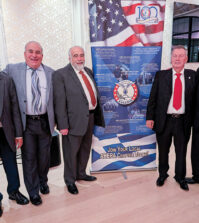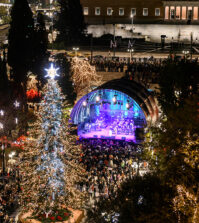Remembering The Turkish Invasion of Cyprus and The Fight to Flee with Famagusta Native and Founder of Aktina FM Elena Maroulleti
Many organizations and individuals can lay claim to shaping and promoting the Greek and Greek-Cypriot community in the New York Tri-State area, North America’s largest. But few can lay a claim to being unparalleled in their service and leadership. Elena Maroulleti is one of those people. For nearly 50 years, Marouletti has been at the forefront of the cultural, artistic, and political efforts of New York’s community. Born in Famagusta, Cyprus, Maroulleti lived through the brutal 1974 Turkish invasion, firsthand, when she and her family were forcibly removed from their home. Some time later she returned to her home only to find it occupied by Turkish officers.

Elena Maroulleti, founder of AKTINA FM; PHOTO: ELENA MAROULLETI
She was a co-founder of CYPRECO, one of the oldest Cypriot cultural organizations in America. And in that capacity she has welcomed and worked with many Greek and Cypriot leaders in regards to the longstanding Cyprus issue as well as the promotion of Cypriot Greek culture in the United States. But, it is through AKTINA Productions that most people have come to know Maroulleti. Since 1993, she has been the voice and visionary force behind AKTINA-FM, a groundbreaking station that has informed and entertained the community for decades. NEO sat down with Elena to talk about her traumatic experiences during the Turkish invasion and her illustrious career in the US.

The building (Cyprian Court) where Elena and her family were hiding during the Turkish invasion; PHOTO: ELENA MAROULLETI
You were born and raised in Famagusta, Cyprus. You and your family were forced to leave your home by the invasion. How has that tragedy shaped you? And your continued involvement in the Cyprus question over the years?
This tragedy has shaped me to become who I am today – I guess a sort of a “cultural Ambassador” or a “cultural advocate” for Cyprus – something I started as soon as I set foot in this country with the establishment of the first Greek-Cypriot folk dancing group, a non-profit known as “The Vraka,” Inc., which later evolved to a full-fledged cultural organization known as CYPRECO of America, Inc.
As I started my mission to promote Cyprus, I set aside the pain and ongoing nightmares stemming from living through both the first and second phase of the 1974 Turkish invasion which traumatized me immensely. With full commitment and determination, I focused my mind and soul to my mission and to an exclusive goal to promote this tragedy mostly among Americans through cultural activities. In my view, the most effective way to educate non-Greek audiences about this tragedy is by showcasing our culture and discussing our history from ancient times to present.

The building right next to Cyprian Court which was bombed; PHOTO: ELENA MAROULLETI
My unwavering love for my hometown, Famagusta, which I forcibly and abruptly abandoned to save myself from the barbaric, invading Turkish army without taking anything – only the clothes on my back and thinking that we will soon return – has been my driving force all these years. Famagusta keeps me going and she gives me the strength I need to continue. When I bring Famagusta into my mind, it seems that she is communicating with me!
Leaving everything behind at the spur of the moment – especially my guitar and our pets – was devastating to me. So I decided – with my mother, Lucy – a few days after the 2nd invasion to risk our lives to go back and get them. My mother, however, tricked me and woke up much earlier and went on her own. When she arrived in Deryneia, on the northeast side of the island by the boundaries of Famagusta, she was stopped at a checkpoint set by Greek Cypriot soldiers who told her that she cannot enter Famagusta because it’s been taken over by the Turkish army. Other Famagustians who tried to return were arrested while others were executed on the spot. My courageous mother responded that she did not care if there were Turkish soldiers inside the city, and, at her own risk, she must enter because she made a promise to her daughters to bring back some very important things.

PHOTO: ELENA MAROULLETI
Did she make it there?
Among the soldiers denying her entry happened to be one of our relatives from my father’s side who kept appealing to her to return to the refugee camp. Then, my mom pressed on her car’s accelerator and told them that if they didn’t open the gate she would go through it, and if they didn’t want to get mowed down they’d need to step aside. Our relative who knew Lucy’s strong character told them that she truly meant business, so they opened the gate and let her in. She went to our apartment at Cyprian Court on Kennedy Avenue where we were hiding during the second phase of the invasion. She parked her car under the building in a spot where it could not be detected from the street and went upstairs to the sixth floor. After making several trips she picked up my guitar, our birds, a briefcase where she kept all of the deeds of our properties, some important heirlooms we brought to the apartment for safekeeping, a few clothes, and a set of utensils and plates only for three – for herself, for me, and for my younger sister Christiana.

Now it’s inhabited by officers of the Turkish occupying army; PHOTO: ELENA MAROULLETI
Lucy returned to the British controlled Anzio camp in Dhekelia around 1:00 pm holding in one hand my guitar and, in the other, a cage with the birds. She proudly announced to me and my sister: “Elena, here’s your guitar and your 5 partridges, I brought them back. Christiana, I placed your three parakeets with the other birds, and I brought them back. Elena, unfortunately your hedgehog did not make it; he committed suicide and fell to his death from the 6th floor.” Hundreds of people living in the camp surrounded her and kept asking: “Are there Turks in Famagusta?” Her response was that when she was loading the car, she noticed some Turkish jeeps with soldiers driving along Kennedy Avenue, but she was uncertain what the real situation was, adding that she was lucky enough to get out without being seen or caught, and that she did not advise anyone to go back.
I guess anyone reading this story can easily detect from where my strong determination comes in pursuing what I want and why I never give up, no matter what. Obviously, I get it from my fully determined and courageous mother, Lucy, who risked her life for a guitar and 8 birds!
For historical purposes, I wish to point out that the entire area outside the old walled city which is under occupation is called Varoshia, and it encompasses the sealed-off area which became to be known as “the ghost town.” It also includes the resort part of the town on Kennedy Avenue. And, for a short history lesson, the original town of Famagusta is the historic fortified city which fell to the Ottoman Turks in 1571 following 13 months of siege and heavy bombardment. Following the takeover of the city, the Ottomans banished all Latins, and then in 1573, they also banished all Greek Cypriots. Between 1573 and 1574 the Greeks built a new city outside the old one which they called Varosi or Varoshia which means suburb/s. The entire cityscape, however, comprised of both the old walled city and the new city, is officially known and called “Famagusta” without distinctively separating the two cities.

PHOTO: ELENA MAROULLETI
Have you ever visited the city and your house since?
Yes. When I visit my occupied town and I look at the buildings – especially those by the seashore on Kennedy Avenue – my heart breaks because I get this strange feeling that these lifeless skeleton structures which continue to proudly stand tall despite being bombarded and stripped of everything, are looking at me with deep sorrow and are sending me a powerful message that says, “we are still here waiting in vain for you to return. Don’t give up!” Since my town is crying out to me asking for freedom, how can I ever give up on her or the rest of the occupied areas?
Are you hopeful that the city will be liberated and returned to its lawful inhabitants?
I must confess that my biggest disappointment is how poorly the Cyprus problem has been handled over the years during the negotiations by all former presidents, especially how badly they handled the issue for the return of Famagusta. We lost too many opportunities to get our city back. Several proposals have been submitted over the years to return Famagusta, with the first being in 1976 and the second on July 20, 1978. These were rejected from the get-go by the Greek Cypriot side. Subsequently, Famagusta became a trading card, with the Cyprus Governments never exhausting the means and their responsibility to restore the constitutional rights of Famagustians who have heard too many excuses for these rejections with the most popular being the “Cyprus problem” which is about the return of all occupied areas and turning our focus only to the return of Famagusta, the problem will then become the “Famagusta problem” and not the “Cyprus problem.” Such a silly excuse! Famagusta was not the only occupied part offered back to us in the early stages of the negotiations. A part of the Karpass Peninsula was also offered for return. However, instead of accepting anything and everything we were ever offered, and to take steps to negotiate for the rest – because of certain special interests as many have come to believe – consecutive Cypriot leaders have not accepted anything and rejected everything.

PHOTO: ELENA MAROULLETI
What’s your take on the Cyprus problem today?
50 years later, instead of resolving the “Cyprus problem,” we have reached a solid deadlock following the adamant refusal of the current Turkish Cypriot leader Ersin Tatar to participate in the resumption of the UN brokered talks for a solution based on a bi-communal, bi-zonal federation with political equality as defined in UN resolutions, unless his pseudo state in the occupied north is recognized so that he can negotiate on the equal status of “two states.” In other words, Tatar wants the Cypriot government to officially recognize and legalize the pseudo state, and at the same time also accept and legalize the illegal 1974 Turkish invasion and continued occupation!! What can I say? Bravo to the Greek Cypriot side for their 50-year-old “exceptional political negotiation techniques” which sadly brought us face to face with the only thing we have always feared…possibly the official partition of our country?!
Many people don’t know this but Famagusta was one of the most popular European beach destinations before the invasion. In fact, the southern part of Varoshia, is essentially the world’s biggest “ghost town.” Why has that area remained abandoned, even under Turkish occupation?
That area was entirely sealed-off and entry was not permitted to anyone except to the Turkish army until two years ago when Turkish President Erdogan, during a visit in Famagusta, had officially announced the re-opening of a good part of the sealed-off area. As to the question why they kept it sealed-off prior, it’s because they wanted to use that part of the town as the last negotiating trading card for the resolution of the Cyprus problem.
In my view, the present deadlock in the talks – which evolved from prior, early-on unsatisfactory negotiations – also stems from the 2017 failure of the talks in Crans Montana. By the way, the Crans Montana failure is attributed to the Greek Cypriot side according to a May 2024 public statement by former EU Commission President Jean-Claude Juncker. I also believe that the existing deadlock in the negotiations has prompted the Turks to proceed with this gesture of re-opening part of the sealed-off area. This gesture was further supported with the election of Tatar, an extremist and also an even bigger “puppet on the string” Turkish Cypriot leader, in comparison to his predecessors, who exclusively serves the expansionist aspirations of Turkey on Cyprus, and who, as I mentioned earlier, is now audaciously demanding a “two state” solution.
Despite the current efforts of Cyprus President Nikos Christodoulides to resume the negotiation process for the resolution of the Cyprus problem and to prevent the re-development of the formerly sealed-off area of Varoshia, the Turks are usurping illegally Greek Cypriot properties and have already announced plans to knock down existing buildings and rebuild that area. They have already fixed the roads, restored water and electricity, changed the names of streets to Turkish ones, erased with plaster Greek names on landmarks, and fixed and utilized some Greek Cypriot hotels at the entry point of the resort area so that Turks and tourists can “enjoy” our beautiful golden sand beaches. More appallingly, the Turks are promoting tourism and excursions – encouraging foreign and domestic visitors to come and tour and spend time in the now opened area of the city, and – exclusively using bicycles – to go around and “marvel” at our tall “skeleton” buildings on Kennedy Avenue and the rest of the destroyed buildings and landmarks on Democratias Street as well as other surrounding streets. I consider this gesture absolutely macabre! In this respect, I no longer consider that area “abandoned” but rather an area being “raped” on a daily basis. By constantly altering the character of our city, the Turks have succeeded in erasing our memories by making the occupied area of Varoshia unrecognizable.

PHOTO: ELENA MAROULLETI
What are your feelings when visiting the occupied area?
Despite the deep pain I feel seeing my city being constantly destroyed and “raped,” I set my feelings aside when I must visit exclusively as a journalist and not as a “tourist” to record, film and report on the constant destruction of my town, unlike other compatriots of mine, even Famagustians, who constantly visit and many even rent rooms in our stolen hotels to spend “happy” time in our raped city.
Do I believe Varoshia will be returned? Realistically speaking and, under the present circumstances which I mentioned before, the answer is unlikely. Do I believe the “Cyprus problem” will be solved to our satisfaction? No, never. It may be resolved with countless concessions from our part. Do I want to go back to Famagusta in its present state if it is returned to us? No. All my memories have been erased. Only when the city is restored back to its Greek character, then I will gladly go back.
Do I foresee the partition of Cyprus? Although I do not ever wish to see my country divided, under the present circumstances, sadly I fear that unfortunately the Turks are leading us to its partition. This, however, can be prevented by utilizing extremely smart, realistic and careful negotiating techniques for the benefit of all expelled refugees. 50 years later and at this stage, we have to be realistic, not romantic, and accept the fact that certain Greek Cypriot refugees will never be able to return. In this respect, since money cannot compensate for losing your roots and your ancestral land, as a last resort, at least they should be fully compensated for their stolen properties.
You founded AKTINA back in 1993. It has been such an important part of our community since. You recently arrived at 30 years of broadcasting. Did you do anything to celebrate this milestone?
In 2023 AKTINA Productions, Inc., (AKTINA), along with its media asset, AKTINA FM celebrated their 30th anniversary. We feel extremely proud and honored for this accomplishment as it further verifies the interest, trust and respect our devoted and supportive audience continues to show towards our multifaceted cultural activities which include the delivery of AKTINA FM and AKTINA TV. Looking back at this 30-year old unique long journey, it is also fascinating when we consider and acknowledge our countless radio listeners from the new generations who grew up listening to AKTINA FM and whose children are now also listening.
AKTINA continues with distinction to serve the needs of the new generations of Greek-Americans so that they can preserve their rich cultural inheritance through the delivery of AKTINA FM, AKTINA TV and through live performances. In support of its ongoing mission of providing exceptional activities, AKTINA always focuses on upgrading the programs and services it offers, especially through AKTINA FM and AKTINA TV.
AKTINA Productions, Inc., is a non-profit and tax-exempt under 501(c) 3 Media and Arts Cultural organization that owns and operates AKTINA FM and AKTINA TV. A multi-awarded organization recognized for its immense contributions to the promotion and preservation of the Greek and Cypriot cultures for the benefit of Greek and Greek-Cypriot Americans and of the general audience, AKTINA is the recipient of many Citations, Proclamations and Congressional Records from legislators of the local, state and federal governments. Its radio station, AKTINA FM, is the first Greek American Radio to be honored by the City of New York with a street co-named in its home base of Astoria, known as “AKTINA FM Way.”
AKTINA FM is streaming from its own websites every day, 24 hours, 7 days a week reaching 1 million listeners in NYC and over 2 million nationwide and worldwide. AKTINA TV broadcasts on Sundays at 6pm on WNYE-CH. 25 and reaches over one million people in the New York Tri-State area. I wanted to also note that AKTINA FM is also available on all smart speakers such as Alexa, Google Home, Apple Siri and on a myriad of other online platforms streaming radio.

PHOTO: ELENA MAROULLETI
After you arrived in the States, you had worked for a number of organizations, most notably, ABC and later in its news division, ABC News. Did you always know you would enter broadcasting? How did that prepare you for all your later success?
As a child I was always fascinated with radio, and I would say it was always in the back of my mind to become a broadcaster. I also love Greek and Cypriot music and traditional dancing. I studied guitar at an early age and also joined a traditional folk dancing group in Famagusta. My initial studies were in Business Administration, so when I came to the United States, I was very lucky to immediately land a job with TIAA-CREF, an Insurance company. In July 1978, despite resistance from my family, I took the bold decision to quit my job and apply at ABC. While waiting for a response I got a job at the NYC Department of Education where I worked for only two months because one day I got the anticipated phone call from ABC to come in for an interview.
Among the first things I was asked during the interview was to tell them what my aspirations were at ABC. My response was that I wanted to get a job in the news division or anywhere in broadcasting. I was told that unfortunately there was only one opening in the personnel department that I happily accepted. I was also told that ABC provides scholarships, and, a few months after I was hired, I applied and was awarded a scholarship and started evening classes at FIT studying News Broadcasting, Advertising and Promotion. While studying at FIT, I landed a job in the News Division. I worked very hard and gradually went up the ladder. My position until the end of my career at ABC News in 2001 was Supervisor of the News Library at Good Morning America.
You’ve achieved such success, inspired by an entrepreneurial spirit. What advice do you give to those just starting out? Especially those who want to embark on a career in broadcasting and journalism?
I will never forget the discussion I once had with the late Peter Jennings at ABC News when we were discussing my success with AKTINA FM and my journalistic inspirations. First, he commended me for my determination to get into the news department and for enrolling at FIT to study the industries of my interest and for my success with AKTINA FM. However, he stressed that education is not always necessary and brought up his example. I totally agree with the late Jennings, who barely finished high school and transformed himself into one of American television’s most prominent journalists and news anchors. Whether or not you have an adequate college education, ongoing study and research to enhance your knowledge on the topics you touch upon is absolutely necessary. Once you are fully equipped with all necessary tools and you already have the know-how, talent and knowledge, then go for it full speed.
My motto, which I’ve shared with many young people over the years who have asked for my advice, has always been: “Always look up and go forward, never give up, take bold decisions and never rest until you reach your goal! Never start a task unless you are absolutely sure that you can deliver it in the most professional manner and without any discounts.”















0 comments